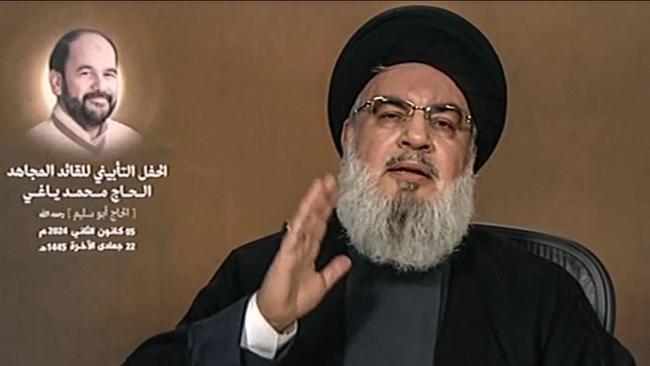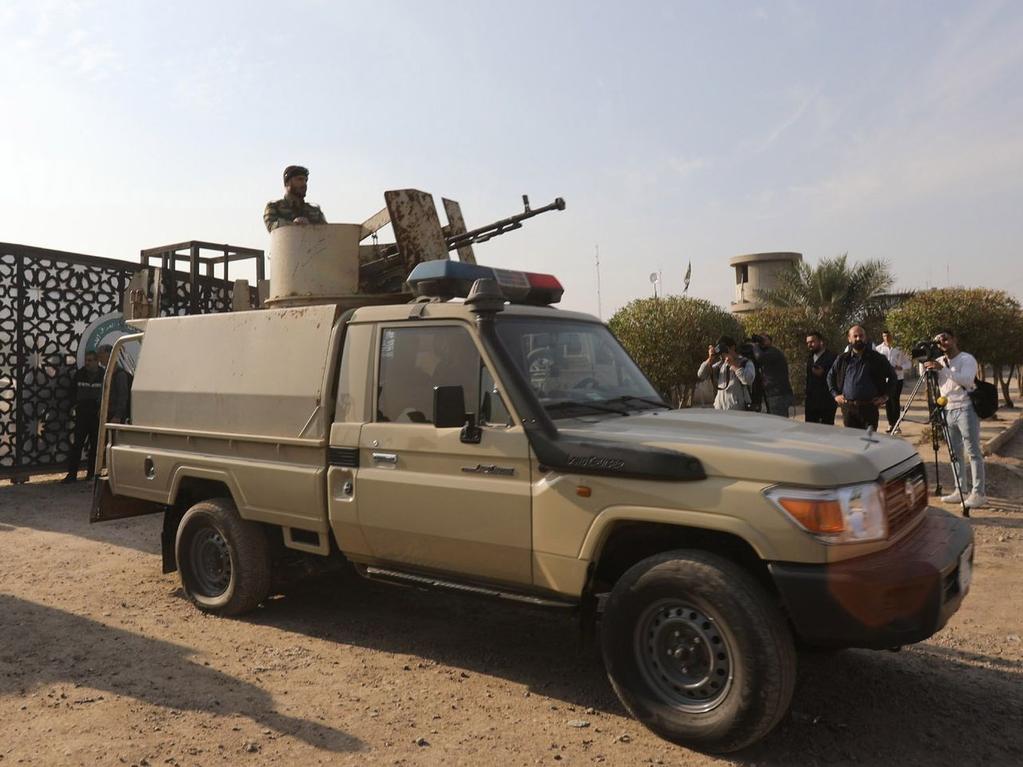Hezbollah fires rocket barrage into Israel as Blinken tours region
Attacks are flaring across the Middle East as tensions from the war in Gaza deepen.

Militants in Lebanon launched about 40 rockets into Israel on Saturday — one of the largest such barrages in recent months — as the Biden administration’s top diplomat arrived in the region to defuse an escalating Middle East crisis resulting from the war in Gaza.
The Israeli military said it launched airstrikes and fired back at militants who had been launching rockets. Hezbollah, an Iranian-backed Lebanese armed group, said it fired rockets at an Israeli observation post as an initial response to the killing of Hamas leader Saleh al-Arouri on Tuesday.
The killing of Arouri and six other people in an airstrike on an office in Beirut, along with intensifying attacks by Hezbollah, is raising the risk that Israel’s three-month-old war with Hamas in Gaza could spiral into a broader regional confrontation that could draw in the US, Iran, and Tehran’s network of militia allies throughout the region.
Lebanese officials said Arouri’s killing was a suspected Israeli attack. Israel has neither confirmed nor denied carrying out the strike. Israeli leaders have sworn to hunt down Hamas’ leadership after the October 7 Hamas-led attack that killed more than 1200 people, mostly civilians.
Secretary of State Antony Blinken arrived in Istanbul on Friday night at the start of a regional tour. At a press briefing in Crete on Saturday he said, “We have an intense focus on keeping this conflict from spreading”.
“It’s very important that Israel have security in the north,” Mr Blinken added.
Mr Blinken said both Israel and Lebanon have an interest in avoiding escalation. “Nothing is inevitable because countries are clearly going to calculate what their interests are,” he told reporters.
The secretary also said the US would continue to focus on getting the hostages out of Gaza and expressed concern over the humanitarian situation there, which he called dire.
“It’s imperative that we see a substantial and sustained increase” in humanitarian aid flows, he said.
More than 22,000 people, mostly women and children, have been killed since Israel launched a military operation in Gaza aimed at toppling Hamas from power, according to Palestinian health officials. The number doesn’t distinguish between combatants and civilians.
“We are in a very high state of readiness in the north, prepared in defence and offense,” said Daniel Hagari, the Israeli military’s chief spokesman, on Friday night, referring to the threat of attacks from Lebanon. Israeli jet fighters and drones struck a range of targets in southern Lebanon including Hezbollah military sites, the Israeli military said. Israel also shot down an aircraft that entered its airspace from Lebanon, the military said.
Hassan Nasrallah, the leader of Hezbollah, on Friday said the group’s response to Arouri’s death was “undoubtedly coming”. “We will not remain silent about a violation of this level because this means that all of Lebanon will be exposed,” he said in a televised speech.
The US and Israel have designated Hamas and Hezbollah as terrorist organisations.
Hezbollah and Israel have traded fire since the beginning of the war, with hostilities escalating in recent weeks. A full-scale war could be devastating for both sides because of Hezbollah’s arsenal of missiles and other weapons provided by Iran. During Israel’s last war with the group in 2006, Israeli warplanes bombed the Beirut airport and other key infrastructure.
In another sign of an escalation in the fighting, Israeli airstrikes reached deeper into Lebanon on Saturday than they have in the previous three months of the war, according to Lebanese authorities. Strikes hit the town of Kawthariyat Al-Siyad more than 50km north of the Israeli border, according to Lebanon’s state-run National News Agency.
Randa Slim, director of the Conflict Resolution and Track II Dialogues Program at the Middle East Institute in Washington, said that militant groups like Hezbollah are likely to continue striking Israeli targets as long as the war in Gaza continues in order to put pressure on Israel and prevent the elimination of Hamas.
“We have been at this now for three months, and the escalation continues up the ladder. We don’t know when a tipping point will be reached,” she said.
The EU’s foreign-policy chief, Josep Borrell, meanwhile, was in Beirut, where he said he aims to de-escalate the worsening tension in the region.
“We look forward to achieving stability and we are conducting all the necessary contacts in this regard, for any large-scale bombing in southern Lebanon will lead the region toward total explosion,” Lebanon Prime Minister Najib Mikati told Mr Borrell during their meeting, according to NNA.
The conflict has heightened the risks for US military forces in the region who have increasingly come under attack by Iranian-backed militias in Iraq and Syria. Since mid-October, there have been at least 115 attacks on US and Coalition forces in Iraq and Syria according to US. officials. The war in Gaza has also strained US relations with Arab security partners and key allies such as Turkey who have criticised US backing for Israel and called for a ceasefire amid the mounting civilian death toll in the enclave.
The war is also having a ripple effect on the global economy after attacks by Yemen’s Houthi rebels forced major shipping companies to divert ships from the Red Sea and the Suez Canal in recent weeks, instead sending ships around the Horn of Africa. The US issued an ultimatum to the Iranian-backed Houthis this week warning of consequences for further attacks on ships, a prelude to possible military strikes against the group.
A senior US official said Washington is walking a tightrope in the region, calling on regional actors to use their influence to avoid an escalation on one hand while insisting that the U.S. will defend its personnel and ships transiting the region.
The official said that the conversations in Israel were expected to be difficult and to focus on planning for the future of Gaza in the aftermath of the current war. The US and Israel are at odds over who should control Gaza, with Israeli leaders rejecting US calls for the Palestinian Authority to take control.
Mr Blinken met with Turkish President Recep Tayyip Erdogan on Saturday along with the country’s foreign minister. He met Greek Prime Minister Kyriakos Mitsotakis in Crete.
During their meeting, Mr Blinken and Erdogan “emphasised the need to prevent the conflict from spreading,” according to a State Department spokesman.
Mr Erdogan, a longtime critic of Israel who has opposed the Biden administration’s backing for the war, is a key actor who holds leverage over the US as it tries to achieve its broader strategic aims. The Turkish president has delayed his country’s approval of Sweden’s accession to the NATO while seeking U.S. concessions including the approval of a new fleet of F-16 warplanes.
Mr Blinken said he discussed with Turkish officials the final steps to win ratification for Sweden’s NATO bid, which he said would be completed in the coming weeks.
Carrie Keller-Lynn and Summer Said contributed to this article
The Wall Street Journal





To join the conversation, please log in. Don't have an account? Register
Join the conversation, you are commenting as Logout